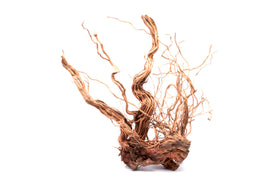
Blue Bolt Extreme Shrimp
Common Name: Blue Bolt Extreme Shrimp, Blue Bolt Extreme
Scientific Name: Caridina Cantonensis "Blue Bolt"
Genus: Caridina
Wild Origin: Asia
Adult Size: 1.25in
**Note: All livestock orders will come carefully packaged with solid wall Styrofoam insulation and shipped via 1-day shipping only. No extra insulation needs to be added to your cart for your livestock.
Blue Bolt shrimp belong to the Caridina species and originate from Taiwan. Their appearance typically features a deep sky blue body, which may transition gently into a cloudy white tail.
The best specimens have a deep and consistent sky blue hue throughout their bodies. These individuals exhibit minimal to no white areas. Mid-grade individuals tend to display a mix of darker and lighter patches, predominantly near the head. Lower-grade variants show approximately equal parts of white and blue coloring, with somewhat irregular and uneven patterns. This appearance resembles that of a Steel Blue variety.
Maintaining blue bolt shrimp can be challenging, as they, like many Caridina varieties, demand specific water conditions for their well-being. With ideal parameters, these shrimp can thrive for 1-2 years. Maintaining a KH near 0-1 is crucial to ensure safe molting.
They thrive in slightly acidic water, even as low as 5.5 pH. To stabilize pH in low-KH setups, it's recommended to use buffering or active substrate. This compensates for the absence of carbonates that typically stabilize pH fluctuations.
Key Features & Important Notes
- Tank-raised specimen
- Bright, bold color and pattern
- Shrimp are excellent scavengers and will happily feed on biofilm, decaying plant matter, and algae
- To increase survival rates, please allow 2-3 business days after placing an order to properly prepare live animal shipments
Recommended Water Parameters
Listed information should be treated as general guidelines only. We encourage you to do thorough research before committing to keeping any livestock.
- Temperature Range: 68-76 F
- pH: 6.0-6.5
- TDS: 100-150
- GH: 3-5
-
KH: 0-2
Recommended Tank Size
5+ gallons, minimum. Tank size is relative and various factors should be considered when determining tank size. Factors include maintenance schedules, tank mates, desired colony size and more.
Diet
Algae, biofilm, diatoms, decaying plant matter, spirulina powder, bee pollen, plant-based shrimp pellets/wafers, blanched vegetables
Breeding
Sexing these shrimp can be somewhat difficult until the shrimp begin to mature. Females have slightly larger tails and display a “saddle” formation on the upper body, behind the head, where eggs are stored before fertilization. When female shrimp are “berried”, or have eggs ready for fertilization, the saddle shape will appear more prominent. Once the shrimp are fully-grown the males will be smaller than the females.
Blue Bolt Shrimp are eager breeders given comfortable water parameters and a sufficient food source. Once the shrimp reach maturity, and if there are males and females present, they should breed naturally and frequently. It is recommended to purchase 8-10 shrimp to ensure that there are enough male-female pairs for successful breeding.
When female shrimp have eggs available for fertilization, they will molt and release pheromones that the male shrimp respond to with frenzy. Once the shrimp breed, the eggs will gestate for about 2 weeks. The shrimp fry will feed from the same food sources as adult shrimp and will molt frequently during their early life stages. Leave molted shells in the tank, as the shrimp fry will consume them for extra minerals like calcium that will help their growth.
Keep in mind that if you are keeping shrimp with other species of fish, or possibly aggressive shrimp species, this may affect reproduction. If the shrimp feel threatened or don’t have places in your tank to hide they may not breed.
Check out our blog article to learn how to breed freshwater shrimp.








